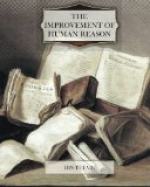As for the Books of Aristotle, Avicenna’s Exposition of them in his Alshepha [i.e. Health] supplies their Room, for he trod in the same steps and was of the same Sect. In the beginning of that Book, says, that the Truth was in his opinion different from what he had there deliver’d, that he had written that Book according to the Philosophy of the Peripateticks; but those that would know the Truth clearly, and without Obscurity, he refers to his Book, Of the Eastern Philosophy. Now he that takes the pains to compare his Alshepha with what Aristotle has written, will find they agree in most things, tho’ in the Alshepha there are a great many things which are not extant in any of those pieces which we have of Aristotle. But if the Reader, take the literal Sense only, either of the Alshepha or Aristotle, with, out penetrating into the hidden Sense, he will never attain to perfection, as Avicenna himself observes in the Alshepha.
As for Algazali[14], he often contradicts himself, denying in one place what he affirm’d in another. He taxes the Philosophers with Heresy[15] in his Book which he calls Altehaphol, i.e. Destruction, because they deny the Resurrection of the Body, and hold that Rewards and Punishments in a Future State belong to the Soul only. Then in the beginning of his Almizan, i.e. The Balance, he affirms positively, that this is the Doctrine of the Suphians[16], and that he was convinc’d of the truth of it, after a great deal of Study and Search. There are a great many such Contradictions as these interspers’d in his Works; which he himself begs Pardon for in the end of his Mizan Alamal [The Ballance of Mens Actions]; where he says, that there are Three sorts of Opinions; 1. Such as are common to the Vulgar, and agreeable to their Notions of things. 2. Such as we commonly make use of in answering Questions propos’d to us. 3. Such private as a Man has to himself, which none understand but those who think just as he does. And then he adds, that tho’ there were no more in what he had written than only this, viz. That it made a Man doubt of those things which he had imbib’d at first, and help’d him to remove the prejudices of Education, that even that were sufficient; because, he that never doubts will never weigh things aright, and he that does not do that will never see, hut remain in Blindness and Confusion.




